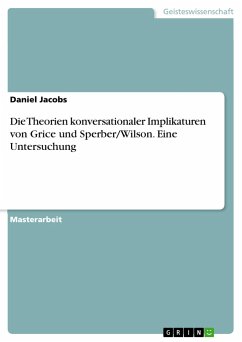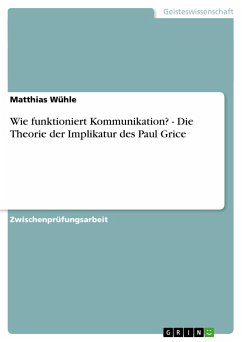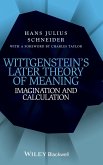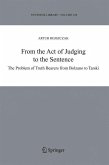Seminar paper from the year 2020 in the subject Philosophy - Theoretical (Realisation, Science, Logic, Language), grade: 1,7, University of Bristol (Philosophy), course: Philosophy of Language, language: English, abstract: When we ask ourselves what sentences are, we conclude that they are types of signs and sounds. So-to-say individual signs and sounds that are executed by people in different situations for a specific purpose, usually for communication. According to Grice, we express our opinion, a wish or intention with the goal of the desired reaction. Therefore, he believes that the meaning of the sentence is rooted in the mental and suggests that it needs to be explained in terms of the psychological states of the individual human being. This might be no less than the reduction of linguistic meaning to psychology. For that in terms of describing Grice's reductive project, the focus is on the explication of sentence meaning in psychological terms. According to him, it proceeds in two importantly different stages: In the first stage, Grice attempts to reduce sentence meaning to speaker-meaning. The second stage contains, his try to reduce speaker-meaning to a complex of psychological states, concentrating on a type of intention. In contrast to Grice, there are two kinds of well-known "use" theories: The Wittgensteinian view and Wilfrid Sellars' Inferentialism. According to these languages and linguistic expressions are neither bloodless abstract objects nor do they have lives on their own. Wittgenstein argued that "words and sentences are more like game pieces or tokens, used to make moves in rule-governed conventional social practices" and Sellars view centralizes the complexity of patterns of inference. Already with this short overview, it has become clear in which manifold theories try to explain theoretically how the meaning of languages comes about. Therefore, the following elaboration is divided into various sub-areas. First Grice's second stage theory, the speaker-meaning, will be explained in detail, before sentence-meaning, as the first stage theory, will be associated. Contrasts will be evinced, before use theories come into play, also by their distinction to Grice's theory. The last investigation will be if either Grice's theory or a use theory of meaning can be squared with truth-conditional semantics. After I have explained why I see a stronger connection between Grice's theory and the truth-conditional semantics, I will conclude the elaboration with a summary.
Hinweis: Dieser Artikel kann nur an eine deutsche Lieferadresse ausgeliefert werden.
Hinweis: Dieser Artikel kann nur an eine deutsche Lieferadresse ausgeliefert werden.








